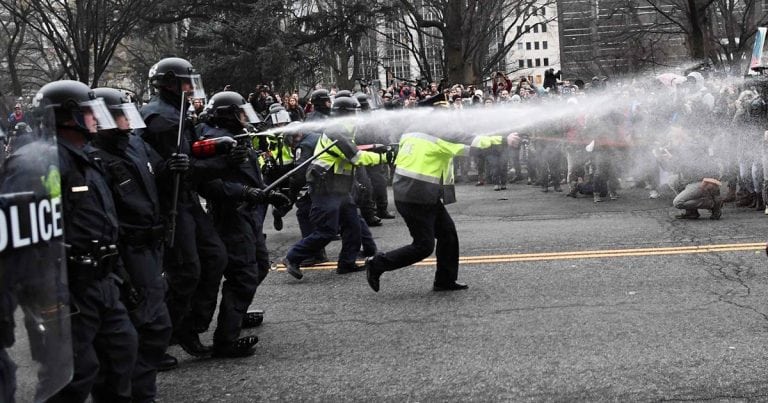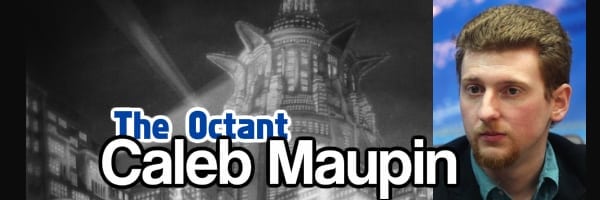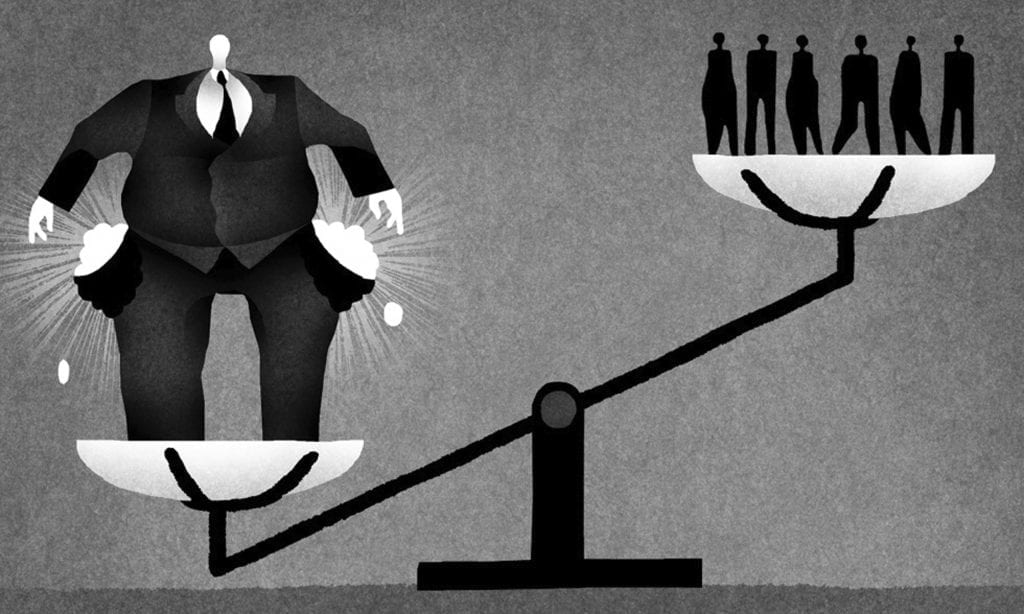Latin America: The Pendulum Swings to the Right
Introduction

The gangster Macri ingratiating himself with Germany's Merkel. World capitalists are delighted on both sides of the Atlantic with his brutal rule.
While the left has been in retreat, they still retain power in some states. Numerous questions arise. What is the nature of the left today? Why have some regimes continued while others have declined or been vanquished? Can the left recover its in uence and under what conditions and with what programmatic appeal.
We will proceed by discussing the character and policies of the right and left and their direction. We will conclude by analyzing the dynamics of right and left policies, alignments and future perspectives.
Right-Radicalism: The Face of Power
[dropcap]T[/dropcap]he right wing regimes are driven by intent to implement structural changes: they look to reordering the nature of the state, economic and social relations and international political and economic alignments.
Radical right regimes rule in Brazil, Argentina, Mexico, Colombia, Peru, Paraguay, Guatemala, Honduras and Chile.
In several countries extreme right regimes have made abrupt changes, while in others they build on incremental changes constituted over time.
The changes in Argentina and Brazil represent examples of extreme regressive transformations directed at reversing income distribution, property relations, international alignments and military strategies. The goal is to redistribute income upwardly, to re-concentrate wealth, property- ownership upward and externally and to subscribe to imperial doctrine. These pluto-populist regimes are run by rulers, who openly speak to and for very powerful domestic and overseas investors and are generous in their distribution of subsidies and state resources – a kind of ‘populism for the plutocrats’.
The rise and consolidation of extremist right regimes in Argentina and Brazil are based on several decisive interventions, combining elections and violence, purges and co-optation, mass media propaganda and deep corruption.
Mauricio Macri was backed by the major media, led by the Clarin conglomerate, as well as by the international financial press (Financial Times, Wall Street Journal, etc.). Wall Street speculators and Washington’s overseas political apparatus subsidized his electoral campaign.
Macri, his family, cronies and financial accomplices, transferred public resources to private accounts. Provincial political bosses and their patronage operations joined forces with the wealthy financial sectors of Buenos Aires to secure votes in the Capital.
Upon his election, the Mauricio Macri regime transferred five billion dollars to the notorious Wall Street speculator, Paul Singer, signed off on multi-billion dollar, high interest loans, increased utility fees six fold, privatized oil, gas and public lands and fired tens of thousands of public sector employees.
Macri organized a political purge and arrest of opposition political leaders, including former President Cristina Fernandez Kirchner. Several provincial activists were jailed or even assassinated.
Macri is a success story from the perspective of Wall Street, Washington and the Porteño business elite. Wages and salaries have declined for Argentine workers. Utility companies secured their highest pro ts ever. Bankers doubled interest rate returns. Importers became millionaires. Agro-business incomes skyrocketed as their taxes were reduced.
From the perspective of Argentina’s small and medium business enterprises President Macri’s regime has been a disaster: Many thousands have gone bankrupt because of high utility costs and harsh competition from cheap Chinese imports. In addition to the drop in wages and salaries, unemployment and under employment doubled and the rate of extreme poverty tripled.
The economy, as a whole, foundered. Debt financing failed to promote growth, productivity, innovation and exports. Foreign investment experienced easy entry, big profits and fast departure. The promise of prosperity was narrowly based around a quarter of the population. To weaken the expected public discontent – the regime shut down independent media voices, unleashed thugs against critics and co-opted pliable gangster trade union bosses to break strikes.
Public protests and strikes multiplied but were ignored and repressed. Popular leaders and activists are stigmatized by the Macri- financed media hacks.
Barring a major social upheaval or economic collapse, Macri will exploit the fragmentation of the opposition to secure re-election as a model gangster for Wall Street. Macri is prepared to sign o on US military bases, EU free trade agreements, and greater police liaison with Israel’s sinister secret police, Mossad.
Brazil has followed Macri’s far right policies.
Seizing power through a phony impeachment operation, the mega- swindler Michel Temer immediately proceeded to dismantle the entire public sector, freeze salaries for twenty years, and extend retirement age for pensioners by five to ten years. Temer led over a thousand bribe-taking elected officials in the multi-billion dollar pillage of the state oil company and every major public infrastructure project.
Coup, corruption and contempt were hidden by a system granting Congressional impunity until independent prosecutors investigated, charged and jailed several dozen politicians, but not Temer. Despite 95% public disapproval, President Temer remains in power with the total backing of Wall Street, the Pentagon and Sao Paulo bankers.
Mexico, the long-standing narco-assassin state, continues to elect one thieving PRI-PAN political regime after another. Billions in illicit profits flow to the overseas tax havens of money laundering bankers, US and Canadian mine owners. Mexican and international manufacturers extracted double digit profits sent to overseas accounts and tax havens. Mexico broke its own miserable record in elite tax avoidance, while extending low wage-tax ‘free trade zones’. Millions of Mexicans have ed across the border to escape predatory gangster capitalism. The ow of hundreds of millions of dollars of pro ts by US and Canadian multi-nationals were a result of the ‘unequal exchange’ between US capital and Mexican labor, held in place by Mexico’s fraudulent electoral system.
In at least two well-known presidential elections in 1988 and 2006, left of center candidates, Cuahtemoc Cárdenas and Manuel Lopez Obrador, won with healthy margins of victory, only to have their victories stolen by fraudulent vote counts.
Peru’s rightist mining regimes, alternated between the overtly bloody Fujimori dictatorship and corrupt electoral regimes. What is consistent in Peruvian politics is the handover of mineral resources to foreign capital, pervasive corruption and the brutal exploitation of natural resources by US and Canadian mining and drilling corporations in regions inhabited by Indian communities.
The extreme right ousted elected left-of-center governments, including President Fernando Lugo in Paraguay (2008-2012) and Manuel Zelaya in Honduras (2006-2009), with the active support and approval of the US State Department. Narco-presidents now wield power by means of repression, including violence against popular movements and the killing of scores of peasant and urban activists. This year, a grossly rigged election in Honduras ensured the continuity of narco-regimes and US military bases.
The spread of the extreme right from Central America and Mexico to the Southern Cone provides the groundwork for the re-assertion of US centered military alliances and regional trade pacts.
The rise of the extreme right ensures the most lucrative privatizations and the highest rates of return on overseas bank loans. The far right is quick to crack down on popular dissent and electoral challenges with violence. At most the far right allows a few rotating elites with nationalist pretensions to provide a façade of electoral democracy.
The Shift from the Center-Left to the Center-Right
The political swings to the far right have had profound ripple effects – as nominal center-left regimes have swung to the center-right.
Two regimes have moved decisively from the center-left to the center- right: Uruguay under Tabare Vazquez of the ‘Broad Front’ and Ecuador with the recent election of Lenin Moreno of PAIS Alliance. In both cases the groundwork was established via accommodations with oligarchs of the traditional right parties. The previous center-left regimes of Ecuadorean President Rafael Correa and Uruguayan President Jose Mujica succeeded in pushing for public investments and social reforms. They combined their leftist rhetoric while capitalizing on the global high prices and high demand for agro-mineral exports to finance their reforms. With the decline in world prices and the public exposure of corruption, the newly elected center-left parties nominated and elected center–right candidates who turned anti- corruption campaigns into vehicles for embracing neoliberal economic policies. The center-right presidents rejected economic nationalism, encouraged large scale foreign investment and implemented fiscal austerity programs appealing to the upper middle class and ruling class.
The center-right regimes marginalized the leftist sectors of their parties. In the case of Ecuador, they split the party, with the newly elected president realigning international policies away from the left (Bolivia, Venezuela) and toward the US and the far right-- while shedding the legacy of their predecessor in terms of popular social programs.
With the decline in export prices the center-right regimes offered generous subsidies to foreign investors in agriculture and forestry in Uruguay, and mine owners and exporters in Ecuador.
The newly converted center-right regimes joined with their established counterparts in Chile and joined the Trans Paci c Partnership with Asian nations, the EU and the US.
The center-right sought to manipulate the social rhetoric of the previous center-left regimes in order to retain popular voters while securing support from the business elite.
The Left Moves to the Center Left
Bolivia, under Evo Morales, has demonstrated an exceptional capacity for sustaining growth, securing re-election and neutralizing the opposition by combining a radical left foreign policy with a moderate, mixed public-private export economy. While Bolivia condemns US imperialism, major oil, gas, metals and lithium multi-nationals have invested heavily in Bolivia. Evo Morales has moderated his ideological posture shifting from revolutionary socialism to a local version of liberal democratic cultural politics.
Evo Morales’ embrace of a mixed economy has neutralized any overt hostility from the US and the new far-right regimes in the region.
Though remaining politically independent, Bolivia has integrated its exports with the far right neoliberal regimes in the region. President Evo Morales’s moderate economic policies, diversity of mineral exports, fiscal responsibility, incremental social reforms, and support from well-organized social movements has led to political stability and social continuity despite the volatility of commodity prices.
Venezuela’s left regimes under President Hugo Chavez and Maduro have followed a divergent course with harsh consequences. Totally dependent on extraordinary global oil prices, Venezuela proceeded to finance generous welfare programs at home and abroad. Under President Chavez leadership, Venezuela adopted a consequential anti-imperialist policy successfully opposing a US centered free trade agreement (LAFTA) and launching an anti-imperialist alternative, the Bolivarian Alliance for the Americas (ALBA).
Advancing social welfare and financing overseas allies without diversifying the economy and markets and increasing production was predicated on continuous high returns on a single volatile export – oil.
Unlike Bolivia under President Evo Morales, who built his power with the support of an organized, class conscious and disciplined mass base, Venezuela counted on an amorphous electoral alliance, which included slum dwellers, defectors from the corrupt traditional parties (across the spectrum) and opportunists intent on grabbing office and perks. Political education was reduced to mouthing slogans, cheering the President and distributing consumer goods.
Venezuelan technocrats and political loyalists occupied highly lucrative positions, especially in the petroleum sector and were not held to account by workers’ councils or competent state auditors. Corruption was rampant and billions of dollars of oil wealth was stolen. This pillage was tolerated because of the huge influx of petro-dollars due to historic high prices and high demand. This led to a bizarre situation where the regime spoke of socialism and funded massive social programs, while the major banks, food distributors, importers and transportation operators were controlled by hostile private oligarchs who pocketed enormous profits while manufacturing shortages and promoting inflation. Despite the problems, the Venezuelan voters gave the regime a series of electoral victories over the US proxies and oligarch politicians. This tended to create overconfidence in the regime that the Bolivarian socialist model was irrevocable.
The precipitous drop of oil prices, global demand, and export earnings led to the decline of imports and consumption. Unlike Bolivia, foreign reserves declined, the rampant theft of billions was belatedly uncovered and the US-backed rightwing opposition returned to violent ‘direct action’ and sabotage while hoarding essential food, consumer goods and medicine. Shortages led to widespread black marketeering. Public sector corruption and hostile opposition control of the private banking, retail and industrial sectors, backed by the US, paralyzed the economy. The economy has been in a free-fall and electoral support has eroded. Despite the regime’s severe problems, the majority of low income voters correctly understood that their chances of surviving under the US-backed oligarchic opposition would be worse and the embattled left continued to win gubernatorial and municipal elections up through 2017.
Venezuela’s economic vulnerability and negative growth rate led to increased indebtedness. The opposition of the extreme right regimes in Latin America and Washington’s economic sanctions has intensified food shortages and increased unemployment.
In contrast, Bolivia effectively defeated US-elite coup plots between 2008-10. The Santa Cruz-based oligarchs faced the clear choice of either sharing profits and social stability by signing off on social pacts (workers/peasants, capital and state) with the Morales government or facing an alliance of the government and the militant labor movement prepared to expropriate their holdings. The elites chose economic collaboration while pursuing low intensity electoral opposition.
Conclusion
Left opposition is in retreat from state power. Opposition to the extreme right is likely to grow, given the harsh, uncompromising assault on income, pensions, the rise in the cost of living, severe reductions in social programs and attacks on private and public sector employment. The extreme right has several options, none of which offer any concessions to the left. They have chosen to heighten police state measures (the Macri solution); they attempt to fragment the opposition by negotiating with the opportunist trade union and political party bosses; and they reshuffle degraded rulers with new faces to continue policies (the Brazilian solution).
The formerly revolutionary left parties, movements and leaders have evolved toward electoral politics, protests and job action. So far they do not represent an effective political option at the national level.
The center-left, especially in Brazil and Ecuador, is in a strong position with dynamic political leaders (Lula DaSilva and Correa) but face trumped up charges by right-wing prosecutors who intend to exclude them from running for office. Unless the center-left reformers engage in prolonged large-scale mass activity, the far right will effectively undermine their political recovery.
The US imperial state has temporarily regained proxy regimes, military allies and economic resources and markets. China and the European Union profit from optimal economic conditions offered by the far right regimes. The US military program has effectively neutralized the radical opposition in Colombia, and the Trump regime has intensified and imposed new sanctions on Venezuela and Cuba.
The Trump regime's ‘triumphalist’ celebration is premature – no decisive strategic victory has taken place, despite important short term advances in Mexico, Brazil and Argentina. However large outflows of profits, major transfers of ownership to foreign investors, favorable tax rates, low tariff and trade policies have yet to generate new productive facilities, sustainable growth and to ensure economic fundamentals. Maximizing profits and ignoring investments in productivity and innovation to promote domestic markets and demand has bankrupted tens of thousands of medium and small local commercial and manufacturing firms. This has led to rising chronic unemployment and underemployment. Marginalization and social polarization without political leadership is growing. Such conditions led to ‘spontaneous’ uprisings in Argentina 2001, Ecuador 2000 and Bolivia 2005.
The far right in power may not evoke a rebellion of the far left but its policies can certainly undermine the stability and continuity of the current regimes. At a minimum, it can lead to some version of the center left and restoration of the welfare and employment regimes now in tatters.
In the meantime the far right will press ahead with their perverse agenda combining deep reversals of social welfare, the degradation of national sovereignty and economic stagnation with a formidable profit maximizing performance.
 James Petras is a world-renowned public intellectual. He is a retired Bartle Professor of Sociology at Binghamton University in Binghamton, New York and adjunct professor at Saint Mary's University, Halifax, Nova Scotia, Canada who has published extensively on Latin American and Middle Eastern political issues.
James Petras is a world-renowned public intellectual. He is a retired Bartle Professor of Sociology at Binghamton University in Binghamton, New York and adjunct professor at Saint Mary's University, Halifax, Nova Scotia, Canada who has published extensively on Latin American and Middle Eastern political issues.













